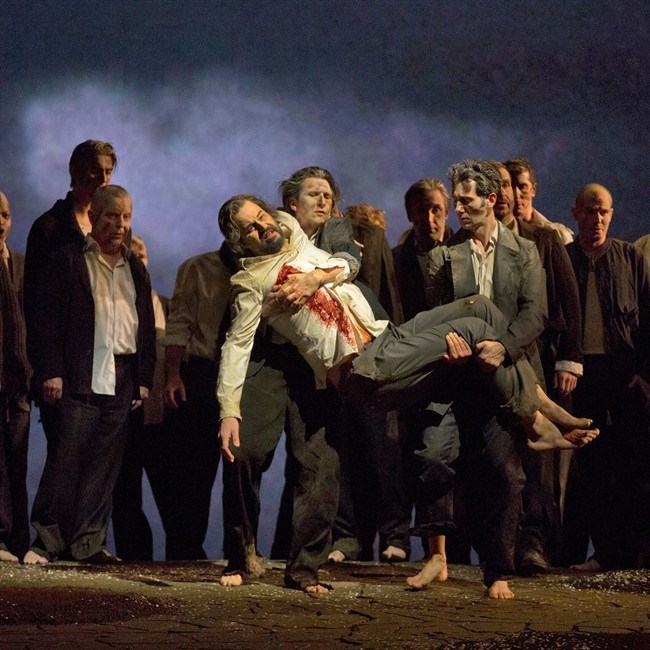It's midmorning, less than 12 hours after he finished another grueling performance as the tormented Amfortas in Wagner's "Parsifal," and Peter Mattei is already singing again.
"My voice is in perfect shape. I could do a show tonight," the Swedish baritone said in an interview last week, midway through a seven-performance run of Wagner's final opera. "I check after each performance. I sing some Bach, some lieder, because I want to make sure everything's OK. So far, so good."
Better than good, the critics agree. James Jorden in the New York Post praised his "velvety baritone," while Manuela Hoelterhoff for Bloomberg News enthused: "I don't think better singers exist anywhere in the world, especially Peter Mattei as Amfortas."
Listeners have a chance to judge for themselves Saturday when a live matinee performance will be broadcast on the radio and shown in HD on movie theatres around the world. Headlining the cast of the new Francois Girard production are tenor Jonas Kaufmann in the title role, bass Rene Pape and soprano Katarina Dalayman. Daniele Gatti conducts.
Amfortas, though a supporting role, is crucial to "Parsifal." He's the leader of the Knights of the Grail, but is unable to perform his duties because of an agonizing wound inflicted on him by a sorcerer after he was seduced by a beautiful woman. His two long monologues in Acts 1 and 3 are punctuated by cries of rage and remorse, often over heavy orchestration.
When Mattei agreed to debut the role at the Met, he was known mostly as a Mozart singer, and the only Wagner he had sung was the lyrical Wolfram in "Tannhaeuser." At first, Mattei confided, "I was a little nervous to do it. Wolfram for me was spot on, but I knew Amfortas was a step up dramatically.
"You have to dig in a little bit," he said. "But I try to do it in the same way as Wolfram, because the beautiful melodies are really there, even if it is very powerful sometimes."
In the Girard production, the physical demands are as great as the vocal ones. While some Amfortases are carried in a chair or stretcher, Mattei staggers on and off the stage leaning on two extras, who have to support virtually his entire weight. Since Mattei is well over 6 feet, that's no easy task, for him or for them.
"Girard told me, 'They are your legs,'" Mattei said. "He told me Amfortas has syphilis, so that's why his legs aren't working. The bone structure is breaking up. My body has this huge tension, singing crumpled over, not using my legs and always leaning on somebody."
Mattei said he wasn't familiar with "Parsifal" when he began studying the role last summer. "I found it a very good piece to not know so much about," he said, "because then you can just listen to the music, and you'll have a much more instinctive input from Wagner than from a professor who knows everything about Wagner and can explain it for days."
Mattei, 47, was born in the town of Pitea in northern Sweden into a family he describes as "quite poor." His father, an Italian, worked in a factory and his mother sold bread in a shop. He said he began singing "before I could speak," though he didn't study music full-time until he was 18.
"Singing is something I cannot be without," he said. "Even if there's no audience. It's a need." In fact, during the interview — conducted in the Manhattan apartment where he was awaiting the arrival of his wife and two young children from Sweden — he repeatedly broke into snatches of an aria or recitative to illustrate a point about this or that role.
Mattei made his professional debut in Mozart's "La Finta Giardiniera" at the Drottningholm Court Theatre in 1990, and a year later he drew acclaim in Sweden in Daniel Bortz's "The Bacchae," directed by Ingmar Bergman at the Royal Swedish Opera. An international career soon followed.
He'll be back at the Met next season for Tchaikovsky's "Eugene Onegin." Beyond that, he said, he's interested in exploring some Verdi roles, including the Marquis di Posa in Verdi's "Don Carlo," a role he has sung only in Scandinavia.
And more Wagner? "Maybe the young Wotan," he said, referring to the god who appears in "Das Rheingold," the first opera in the "Ring" cycle.
His fans will be keeping their fingers crossed for that one.



